Partisan politics and harebrained professionals: Tragedy of Sri Lanka
By Dr. Y Ratnayake, former Senior Consultant, Sri Lanka Institute of Development Administration
Ravenousness Makes Sanity Redundant:
The cynical yet horrendous situation faced by Sri Lanka today can find a strange resemblance to a particular proverbial folklore that describes a man struggling to save his dear life from three imminent death threats forgets all his existential dangers and is enticed to enjoy a tasty honeycomb with blissful ignorance of the looming dangers in the immediate surrounding.
Sri Lankans and their partisan politicians are obviously oblivious to the harrowing social and economic crises the country went through a few moons ago -- virtual social anarchy characterized by miles-long queues at filling stations, interruption of domestic gas supply, two power cuts each and every day, unruly street protests of wingnut political movements, scarcity of comestibles and despondency and uncertainty being the order of the day which led the citizens to believe that the country was sliding down a bottomless abyss without any hope of returning to normalcy in the near future.
In the face of the dire economic situation and acute shortages of essential commodities, people were compelled to undergo vast changes in their lifestyle by shifting to medieval household practices such as using firewood stoves and utilizing alternative energy sources in spite of inconveniences associated with them. People were compelled to stay not hours but days in filling stations and domestic gas supplying outlets and such habits were built into the daily chores of many households by virtue of necessity since there was no other visible alternative left for them to pursue.
However, those are the events of the yore that have been totally obliterated from memory without a trace of retrievable capacity and the priorities are now shifted to the conduct of local government elections and annulment of new tax policies which provide ferocious propulsion power for trade unions and holier than thou political apparatchiks to instigate street agitations that unsettle the breathing space created in the last few months after economic mayhem that engulfed the entire country a few moons ego.
The current agitation campaign, driven by a convenient political strategy of demagogy, appears to be showing the preferences and willingness of the vanguard organizers of such mass movements to sacrifice the necessity of gas, electricity, medicine and fuel in exchange for local government election and annulment of new income tax regulations at the cost of the hard-earned breathing space of economic recovery.
Political schizophrenia:
It appears that no protesting political party or trade union is in the mood to engage in a serious discussion on how a regime change will facilitate the change of the economic landscape of the country by way of easing out the high fuel prices, the cost of living, the burden of income tax, pressure on debt payments, etc. as the protesting campaigners have not presented a clear roadmap marked with milestone actions except engaging in loud mouthing of their age-old gibberish which no one cares a tinker’s cuss.
Political leaders irrespective of their different hues always profess that they have the necessary solutions to the burning economic woes at their fingertips while they are not in the saddle of political power. However, the real situation is such that they prove themselves to be nincompoops and clueless amateurs once they are placed in the saddle of government.
A prominent management thinker, Tom Peters, writes in one his of best-selling books that if a person offers a simple and cakewalk solution to a complex problem then such offers must be viewed with skepticism and treated with a pinch of salt. He goes on to say people who act as messiah and offer solutions without giving reasons as to how or why their solutions work are charlatans, a quack doctor, who prescribe medicine without being properly medically qualified and therefore whose advice must better be pooh-poohed at the outset since they have a covert agenda to be achieved by hoodwinking the gullible public.
The current day naysayers purposely mislead the people by their public utterances that they are in the possession of a secret recipe or a magic wand that can unearth instant solutions to the current economic woes of the country but such genius strategies, they further state, can be made active only if and when they are placed in the saddle of government. This line of arguments is akin to schizophrenia in which one fails to recognize the stark economic realities in their face value and engages in facetious treatment of grave economic issues that are existential to a nation.
Naysayers on taxation policy:
As the old adage goes, only two things in life are certain: death and taxes both of which are preferred to be deferred as long as possible since they are abominable, repugnant and horrifying to the earthlings. Albeit taxes represents a financial burden and are disliked by almost all income earners, tax income is the main financial strength that provides the wherewithal to the government for undertaking programs for a country’s development. One of the main policy measures that the professional community has a grinding grudge against is the taxation of professionals whose monthly earning exceeds Rs. 110,000 which they describe in all derogatory terms stating that new income tax levied on them is unjustifiable, intolerable and defies the saner economic logic of taxation.
It appears that what they advise by implication is the imposition of indirect taxes on goods and services to be borne indiscriminately both by the affluent and the penurious. Indirect taxes in the forms of excise duties, VAT, and tariffs are the key contributors to the government tax revenue standing at 74 percent while direct taxes including income tax, Pay as You Earn tax and economic service charges contribute approximately nine percent to the total government revenue structure.
On the expenditure side, the situation is that, albeit the government gets an income of Rs. 145 billion every month, it has to eke out Rs. 93 billion to pay salaries, Rs. 27 billion for pension payments, Rs. 6 billion for Samurdhi allowances and another sum of Rs. 17 billion for social welfare, plus the capital expenditure of Rs. 11 billion. All this adds up to a total of Rs. 154 billion and makes an expenditure gap of Rs nine billion, according to the Finance Ministry Website in 2023.
Government revenue in 2021 stood at 41 percent of its expenditure, which was inadequate to cover even its recurrent expenditure. It falls short of the two largest recurrent expenditure components cumulatively -- salaries and wages, and interest payments. In 2020, the total income tax collection stood at 1.8 percent of the entire government revenue which, in contrast to the revenue structure of other countries, represents a lopsided and unhealthy situation.
If the whole problem is anatomized for the purpose of better comprehension of its magnitude, one may realize that the vast majority of state and semi-state sector employees are not liable to pay the current income tax since their emoluments are much below, not even closer to the, lowest income tax activation level. Accordingly, more than eighty percent of protesters who thronged to Colombo or abstained from work recently to register their resentment against income tax have in fact no grudging grievance against the new tax system.
However, the recent developments undoubtedly prove that demagogy is a powerful tool in the hand of unscrupulous apparatchiks of various political hues and they are hell-bent on instrumentalizing the emotionally stimulated public as a battering ram that resembles the blind obedience demonstrated by a kamikaze. Partisan politics and factoids can totally brainwash the gullible public at the behest of power-hungry political parties. Bipeds are supposed to be destroyed by themselves due to their seven behavioral traits, said Mahatma Gandhi in his insightful wisdom, among which politics without principles is one of the causes that, applied to Sri Lankan, is the principal reason for creating the current economic mayhem that resembles a bizarre boiling frog scenario.
Direct and indirect taxes in developed countries
The protesting trade unionists and professional groups conveniently forget that in countries like the USA, there are two types of tax arrangements, namely state taxes and federal taxes of which the latter includes seven federal income tax brackets, with rates of 10, 12, 22, 24, 32, 35 and 37 percent. There is no national sales tax in the US and therefore no standard rate can be found. Sales or use tax rates vary by state, ranging from 2.9 to 7.25 percent. In addition to the state rate, local governments in 35 states impose an additional sales or use tax ranging from 1 to 5 percent.
In the UK the tax-free Personal Allowance for the 2023-2024 tax year is £12,570. It is the same as the 2022/2023 tax year with the government currently expecting to keep the same personal allowance of £12,570 until April 2026. The £12,570 personal allowance means that one does not need to pay income tax on earnings up to the £12,570 threshold. The income tax bands for the 2023/2024 tax year are being kept the same as the previous tax year and again are currently intended to be in place until 2026. After the £12,570 threshold, income tax is levied on the basis of the following income brackets:
- Basic rate of 20 percent on earnings between £12,571 and £50,270.
- Higher Rate of 40 percent on earnings between £50,271 and £125,139.
- Additional Rate of 45 percent on earnings from £125,140.
It is a common understanding that a government of any country irrespective of its size or political philosophy should have access to financial revenue that can be amassed either by the sale of goods and services or collecting taxes from individuals and enterprises or employing both avenues depending on the circumstances that prevail in a given country.
The option of collecting tax income hinges upon two alternatives, namely, direct taxes and indirect taxes both of which have their intrinsic limitations, advantages and disadvantages. The professional groups that clamor against the income tax levied on their generous income by the Sri Lankan norm have no qualms about the imposition of taxes on goods and services that are utilized by both the rich and the poor alike. Although indirect taxes are equally levied on the entire population irrespective of income differences among households, the irony is that the poorer segments, being the overwhelming majority in numerical terms of the population, involuntarily bear the lion’s share of the tax burden and thereby become the main source of funding the country’s admirative machinery.
Another obvious anomaly associated with high indirect tax alternatives is that the low-income segments are compelled to pay a higher percentage of their income as indirect tax due to their high consumption expenditure while people within the affluent income brackets are paying a lower percentage of their income as goods-and-service tax, nevertheless, they simultaneously purchase comestibles at the same prices that are paid by the poorer households as well. This goes against the natural justice of economics. Another moot point that ought to be brought into the limelight is the question of who the bulk users are that enjoy the public goods such as transport, security, infrastructure, and recreation facilities that are provided by the government, at no cost to the users, with the utilization of tax revenue on a perpetual basis. Professional groups by implication believe that they belong to a privileged echelon of society different from the hoi polloi and therefore entitled to exceptional treatment.
Although the absence of conclusive research data and evidence on who utilizes public goods most, it may not be far from the truth if one assumes that the professional and high-income groups are often the heavy users, in terms of intensity and frequency, of public goods that provide them the essential wherewithal for earning a higher income and thereby enabling them to position themselves over and above the low-income groups in society.
If social media is considered as a mirror reflecting the image of public opinion, then one can find out how the hoi-polloi expresses their utmost disapproval and loathing of trade union actions initiated by university dons and the GMOA against the new income tax arrangements. By implication, their conduct is synonymous with that of a person collecting the maximum amount of milk from the cow, a metaphor for government, while at the same time refusing to undertake the responsibility of feeding and maintaining the milk provider, the cow.
Irrespective of the callous disregard demonstrated by the professional groups and their myopic approach towards economic implications of taxation, a particularly noteworthy spectrum of criticism that has been bought for social discourse by naysayers is the question of irrational utilization of tax revenue by the government which as an argument bears a formidable truth in view of wasteful utilization of tax revenue at the central, provincial and local government levels for various junkets and petty official shindigs in addition to the incidents of rampant corruption.
Promises of messiahs
The messiahs who mobilize the public against the proposed tax structure and the delay in the conduct of local government polls cannot be oblivious to the pros and cons associated with their propaganda. But, it appears, their comportment is totally governed by partisan politics that drives them away from saner or visionary-oriented thinking.
Furthermore, the track record of the messiahs who were in power not so many years ago does not provide an iota of assurance or axiomatic evidence to the effect that their performance, if they eventually come into power, would be in line with what they preach to the people when they are not in power. Partisan politicians, no matter where they exist, are perfect followers of Niccolò Machiavelli who states that the promise given was a necessity of the past: the word broken is a necessity of the present. If one carefully listens to the public blathering delivered by the so-called liberators, what can be gathered in general comprise the promises that are related to the abolition of income tax, reduction of fuel prices, reduction of cost of living, solving of foreign exchange shortages and so forth which represent, without doubt, a cockamamie proposition to anyone with logical cognitive ability.
Albeit the cockamamie characteristics of the promises given, it appears that a large segment of the gullible Sri Lankan population repeatedly ingest those promises hook, line and sinker in their cycle of being deceived and repeatedly mocked. As the German philosopher Georg Hegel famously states the only thing that we learn from history is that we learn nothing from history. This perfectly mimics the behavior of the Sri Lankan nation in view of the political decision-making pattern in the past, the present, and most probably in the foreseeable future as well.
Spencer Johnson in one of his best-selling books, “Who Moved My Cheese” mockingly compares the way humans and mice behave in organizing their daily activities in the effort of finding cheese, a metaphor for food or benefits, in which human behavior is guided by stereotype thinking while mice use their instinct, sniffing ability, in locating the places where cheese is available. When mice find that cheese is not available in a particular location, they immediately vacate the place and find a new location using their instinct because they are wise enough to understand that ransacking or vandalizing the particular location ends up with only disappointment without discovering cheese. Contrary to the conduct of mice, bipeds, when they are told that there is no more cheese at the usual place where they used to obtain cheese, start ransacking the place, dig into the foundation of the building, and organize violent protests demanding cheese from the same organization believing somehow or other cheese is hidden unknown to them in their familiar location. The question of whether humans are wiser than mice in relative terms is still an undiscovered or murky area of epistemology!
Strange stakeholder behavior
Political parties, trade unions, civil societies and professional bodies are obviously an integral part of the nation-state and organizations that have been established for the declared purpose of providing vital facilities to the public at their level best. Nevertheless, the demonstrated behavior of political parties is most likely egocentric by nature and apocalyptic as far as the end results of their conduct are concerned. If what they promise is deliverable, plausible and credible, then the people as a collective entity must facilitate the passage for them to reach the power in the legislature, but economic realities of such boondoggles immediately negate the practicality of fulfilling such Sisyphean and hypocritic promises.
Trade union officials, albeit being the internal stakeholders of the organizations in which they work, are the vanguard forces that spearhead attacks on the employer at the drop of a hat if the employer’s views contradict that of the union’s or their political master’s agenda. Their language is so violent and shrouded with threats though they professed themselves to be professionals and often they openly demonstrate their saber-rattling with bellicose statements to the effect that the whole county would be shut down and the supply of services would be paralyzed unless the government takes immediate action to obliterate programs that do not carry favor with their parochial goals.
It is often alleged that democracy and religion are the last resort of all scoundrels who have no hesitation in instrumentalizing anything for the purpose of achieving their myopic goals at a larger cost to the country. When one observes the enigmatic and apocalyptic conduct of politicians of all hues in the country, one may be surmised whether Gorge Orwell wrote his famous book, Animal Farm, in which he ridiculously states that all animals are equal but some animals are more equal than others, after studying the situation in Sri Lanka. Facetious and cynical treatment of the country’s grave economic issues can frequently be observed in press briefings conducted by trade unions affiliated to the CEB, CPC, GMOA and other organizations with callous disregard for the absurdness of their blathering while ignoring the economic priorities of the masses.
Miserably, egocentric ambitions particularly of the so-called professionals have taken precedence in Sri Lanka over urgent economic priorities with the burning problems of the masses being placed on the back burner while propaganda machines of the interested parties churning pell-mell against the delay of conducting local polls, implementation of new income tax regulations, threats to democracy, etc. which ordinary masses pay a tinker’s cuss to.
A maverick writer, Aravind Adiga, in his controversial book “The White Tiger”, sardonically narrates how the Indian voters are engaged in endless discussions on the conduct of parliamentary elections like eunuchs discuss Vathsayana’s Kamasuthraya, with blissful ignorance of the futility in their exercise.
-
Still No Comments Posted.



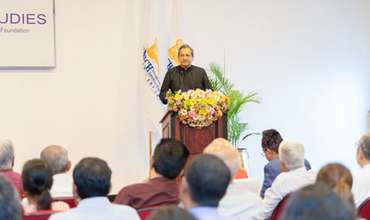
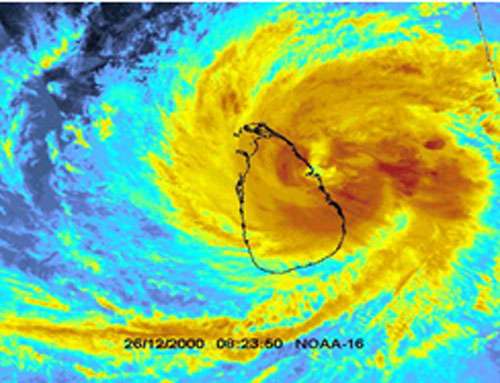
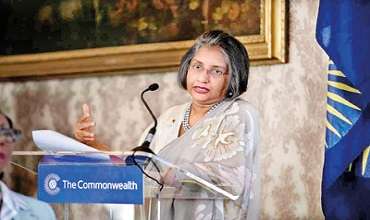
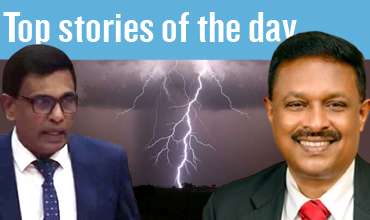



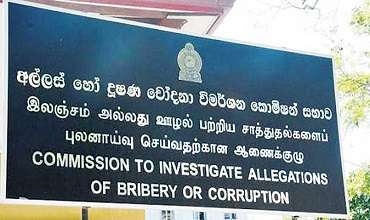

Leave Comments